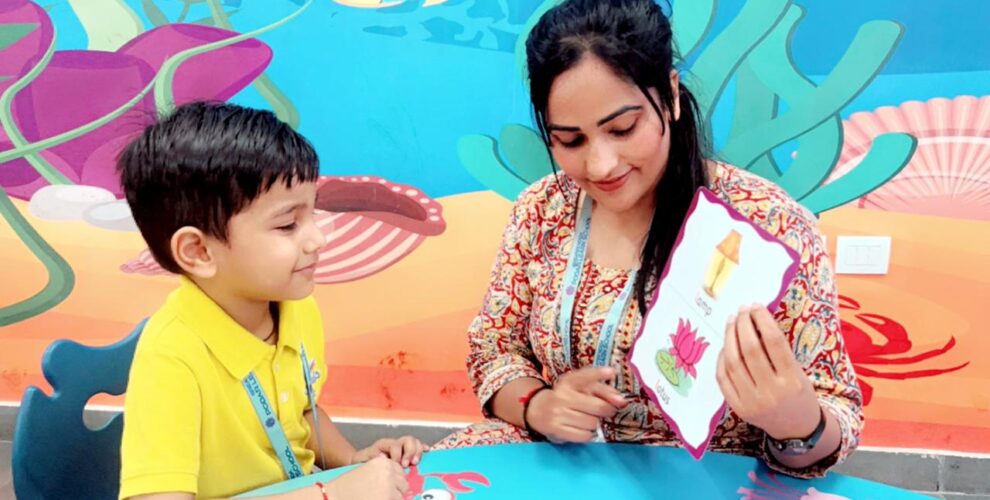Importance of Early Education

Why Early Childhood Education is Important?
Children’s brains grow remarkably between the ages of one and eight, which makes this a critical window of time for schooling. Early childhood health, safety, and education improve a child’s chances of reaching adulthood’s full developmental potential and engaging fully in social, cultural, and economic life.
Numerous studies and pieces of data have come together to bolster this assertion. First, research in neuroscience has demonstrated that early experiences may either provide a strong or weak foundation for a child’s subsequent learning, development, and behaviour. This means that the environment has an impact on the structure of the brain. Second, research has shown that programming for children and adolescents provides higher economic returns on investment than those for adults and adolescents.
What is Early Childhood Education?
Teaching young children is officially referred to as early childhood education. More precisely, it refers to structured and unstructured educational initiatives that support children’s development and growth during their preschool years (birth to age five). Early Childhood Education (ECE) includes a broad range of activities aimed at supporting young children’s social and cognitive development prior to kindergarten entry. While some programs priorities preparing students academically for school, others take a “whole child” approach that stresses mental and emotional health.
Importance of Early Education for a Child’s Development:
Giving children the tools they need to grow into lifelong learners is the goal of early childhood education (ECE). These tools include social, emotional, and cognitive development techniques. The following are the most crucial abilities for young students to acquire:
- Language and Literacy: The development of literacy abilities is predicated on language. A child’s enthusiasm for books and reading improves when they learn to speak.
- Thinking: Children apply and gain a comprehension of mathematical ideas and techniques for solving problems.
- Self-control: The capacity to appropriately express and control one’s emotions.
- Self-confidence: Children are more eager to try new things when they have self-confidence and feel capable.
Cognitive Development:
Early childhood cognitive development is crucial for a number of reasons, including the fact that it establishes the framework for schooling and learning. The ability to reason, think, and solve problems is essential for academic achievement. It describes how a child’s mental faculties—such as perception, attention, memory, language, problem-solving, reasoning, and decision-making—develop and mature throughout time.
When acquired in an early childhood educational setting, cognitive skills can improve a child’s ability to control their emotions, speak clearly, and form connections with others. Additionally, they are more likely to have greater self-esteem and a good self-image. It is crucial for fostering the growth of vital life skills including problem-solving, critical thinking, and decision-making. These abilities are essential for success in all aspects of life, including relationships and employment.
Social Skills:
Early childhood education plays a pivotal role in teaching children how to interact effectively with peers and adults. During these formative years, children learn crucial social skills that will benefit them throughout their lives. They practice sharing, taking turns, and working together, which helps them develop strong communication and cooperation skills. Interacting in a structured educational setting allows children to form friendships, resolve conflicts, and understand social norms, laying the foundation for healthy relationships in the future.
Emotional Growth:
Early education is also essential for emotional growth. In a supportive learning environment, children learn to understand and manage their emotions. They develop emotional regulation skills, which help them cope with frustration, anxiety, and other challenging feelings. Additionally, early education promotes resilience, enabling children to bounce back from setbacks and adapt to new situations. Teachers and caregivers provide the nurturing support that children need to build a positive self-image and emotional well-being.
Language and Literacy:
One of the key benefits of early childhood education is the development of language and literacy skills. During these years, children are exposed to a rich language environment that fosters their vocabulary and communication abilities. Early exposure to reading and storytelling not only enhances their language skills but also sparks their imagination and creativity. These activities are fundamental in preparing children for future academic success, as strong language and literacy skills are critical for learning across all subjects.
Foundation for Lifelong Learning:
Early childhood education lays the groundwork for lifelong learning and academic achievement. Research has shown that children who attend quality early education programs perform better in school, have higher graduation rates, and are more likely to pursue higher education. The skills and knowledge gained in early childhood provide a solid foundation that supports continued educational growth and development. Investing in early education is an investment in a child’s future success and well-being.
By actively participating in your child’s early education, you can help them build a strong foundation for future academic and personal success. Early childhood education is a vital step in preparing children for the challenges and opportunities that lie ahead .At Greater Noida Podar Learn School we have a well researched, scientifically developed curriculum best for Pre-Primary years. To choose the best school in Greater Noida west you can rely on Podar.

